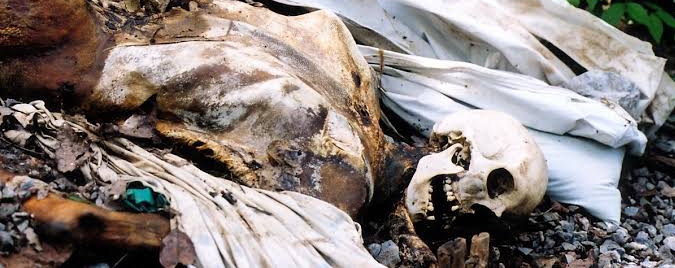It was reported on Social Media Platforms that during the exhumation of the body of Afrobeat Musician, Ilerioluwa Ayoba also known as MohBad, Blood was spotted in the Coffin he was buried with.
The claim prompted Citizen NewsNG to make research on what happens to the Human body after death.
Read the findings of Citizen NewsNG in this article.
The body undergoes a series of changes after death as it adjusts to its new state. These changes unfold quickly, over a few days.
The Muscles relax
The muscles loosen immediately after death, releasing any strain on your bowel and bladder. As a result, most people poop and pee at death. Your skin may also sag, making it easier to see the bone structure beneath.
The Temperature drops
The body temperature gradually decreases about 1.5 degrees Fahrenheit (-16.9444 degrees Celsius) per hour. Eventually, the body temperature will match the surroundings.
The Blood gets pulled downward
Gravity pulls the blood downward, toward the Earth. The skin may look purplish-red in the spots where blood pools.
The Body stiffens
The body stiffens, first, at the face and neck. The stiffening progresses to the trunk of the body and gradually radiates outward to the arms and legs and then the fingers and toes.
The body loosens again. A few days after death, the body’s tissue breaks down, causing the stiff parts to relax again.
Does dying hurt?
It depends. Pain is a part of life and may also be a part of death. Similar to how you experience different types of pain sensations in life (from the type of sensation to how intense it feels), may experience various pain sensations in death. Much depends on your cause of death and whether you have access to pain medications. For instance, Death may occur suddenly and no pain at all.
Often, dying bodies fight to survive. The survival instinct programmed into our bodies can feel painful without medications. For example, a body that’s losing a life-threatening amount of blood will automatically direct the limited blood supply to vital organs. This response keeps these organs alive, but those body parts deprived of blood (like your arms and legs) may hurt. In emergency situations like these, medical professionals are trained to try to save your life and lessen your pain.
For Advert, Event Coverage, Story/Article Publication, Change Of Name & Placement In Newspapers, PR & Other Media Services
Contact Us On: WhatsApp
Send Email To: citizennewsng@gmail.com
Visit Citizen NewsNG To Read More Latest And Interesting News


